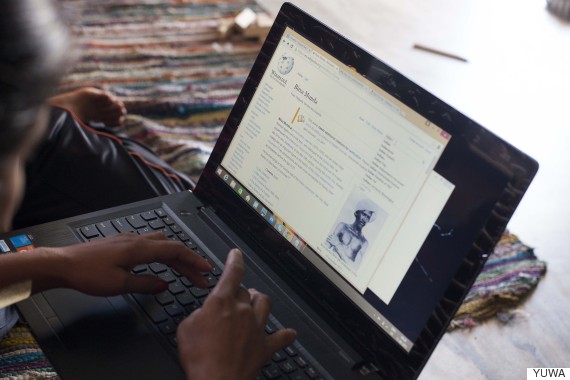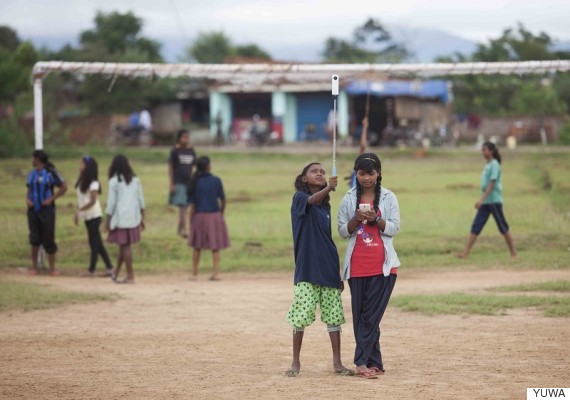A group of young village girls with enormous grit has put the tiny village of Hutup in Jharkhand on the map as a first baby step towards a giant purpose, fighting odds to demand their right to education.
The village now has its very own Wikipedia page, created and updated by these young school-going children. The state of Jharkhand features some of the highest rates of female illiteracy, child marriage and human trafficking. According to the 2011-2012 Jharkhand Census, 6 out of 10 girls are pulled out of school and forced into marriage.
![pitch to her]()
Hutup's Wiki page in the process of being created
“We wanted to introduce technology to girls in a way that will benefit them the most. We thought of putting Hutup on the map as it is a good way to introduce the girls to Wikipedia,” says Rose Thomson, a spokesperson for YUWA, the NGO organisation behind the movement entitled ‘Pitch To Her’. "In the next few years, it is important for these girls to use technology to expand their worldview beyond their own village. For that, they need to know how to navigate laptops; using Wikipedia and Google Maps was an initial step," she says.
In the past, the organisation’s efforts for the women in this area of Jharkhand have received global attention: they run a school in Hutup that places heavy emphasis on football for girls. In 2013, these girls bagged the bronze medal at the Gasteiz Cup in Spain, and were invited last year to participate in the USA Cup match.
![pitch to her]()
Girls film material for Hutup's Wikipedia page
With the introduction of the campaign, computer classes are now taught daily at the YUWA school. “We are looking to unleash simple, and practical solutions that can involve anything from art, and music to product design or even utility apps that can be implemented in 4-6 weeks,” says Thomson who also discloses that the campaign shall come to an end in the second week of September. “The volunteers get to experience the social structure these girls live in and tackle, and the shortlisted ideas (based on technology and sanitation) will help the girls overcome their daily challenges for years to come.”
![pitch to her]()
A fun selfie by the football team
In addition to full time teachers, YUWA also encourages its older girls to act as mentors to younger children. “I want to become a divorce lawyer. Many girls and women want a divorce because their husbands hurt them, and spend all the family’s money on drinking or gambling,” says 15-year-old Rinky who captained the team playing in Spain and the United States. “The women here don’t know how to get a divorce. I want to help women so they can be free to get a good job and save money for their future," she adds.
![pitch to her]()
A young girl captures images of the local hospital for the page
Along with Rinky, two other girls -- Chanda and Neeta (14 and 15-year-olds) -- have taken up coaching younger girls' teams twice a week, in addition to practicing with their own teams and studying (they are currently in the 8th standard). Living in a village where 44 per cent of the women are illiterate (according to the Jharkhand census) hasn’t deterred this trio from dreaming big: they pay their own school fees (75 per cent from the money they make from coaching – anywhere from Rs 400-1,200) to assert their independence in their own homes (many parents in the village coerce girls to drop out of school at this age in order to save money for dowry, reveals Thomson), and eventually want to attend university to pursue their careers.
Post the campaign that has impacted 200 girls so far, YUWA also plans to build a residential centre for the girls in Jharkand – "this centre would be a hub for leadership training, academic excellence and (of course!) football," concludes Thomson.
![]() Like Us On Facebook |
Like Us On Facebook |
![]() Follow Us On Twitter |
Follow Us On Twitter |
![]() Contact HuffPost India
Contact HuffPost India
The village now has its very own Wikipedia page, created and updated by these young school-going children. The state of Jharkhand features some of the highest rates of female illiteracy, child marriage and human trafficking. According to the 2011-2012 Jharkhand Census, 6 out of 10 girls are pulled out of school and forced into marriage.

Hutup's Wiki page in the process of being created
“We wanted to introduce technology to girls in a way that will benefit them the most. We thought of putting Hutup on the map as it is a good way to introduce the girls to Wikipedia,” says Rose Thomson, a spokesperson for YUWA, the NGO organisation behind the movement entitled ‘Pitch To Her’. "In the next few years, it is important for these girls to use technology to expand their worldview beyond their own village. For that, they need to know how to navigate laptops; using Wikipedia and Google Maps was an initial step," she says.
In the past, the organisation’s efforts for the women in this area of Jharkhand have received global attention: they run a school in Hutup that places heavy emphasis on football for girls. In 2013, these girls bagged the bronze medal at the Gasteiz Cup in Spain, and were invited last year to participate in the USA Cup match.

Girls film material for Hutup's Wikipedia page
With the introduction of the campaign, computer classes are now taught daily at the YUWA school. “We are looking to unleash simple, and practical solutions that can involve anything from art, and music to product design or even utility apps that can be implemented in 4-6 weeks,” says Thomson who also discloses that the campaign shall come to an end in the second week of September. “The volunteers get to experience the social structure these girls live in and tackle, and the shortlisted ideas (based on technology and sanitation) will help the girls overcome their daily challenges for years to come.”

A fun selfie by the football team
In addition to full time teachers, YUWA also encourages its older girls to act as mentors to younger children. “I want to become a divorce lawyer. Many girls and women want a divorce because their husbands hurt them, and spend all the family’s money on drinking or gambling,” says 15-year-old Rinky who captained the team playing in Spain and the United States. “The women here don’t know how to get a divorce. I want to help women so they can be free to get a good job and save money for their future," she adds.

A young girl captures images of the local hospital for the page
Along with Rinky, two other girls -- Chanda and Neeta (14 and 15-year-olds) -- have taken up coaching younger girls' teams twice a week, in addition to practicing with their own teams and studying (they are currently in the 8th standard). Living in a village where 44 per cent of the women are illiterate (according to the Jharkhand census) hasn’t deterred this trio from dreaming big: they pay their own school fees (75 per cent from the money they make from coaching – anywhere from Rs 400-1,200) to assert their independence in their own homes (many parents in the village coerce girls to drop out of school at this age in order to save money for dowry, reveals Thomson), and eventually want to attend university to pursue their careers.
Post the campaign that has impacted 200 girls so far, YUWA also plans to build a residential centre for the girls in Jharkand – "this centre would be a hub for leadership training, academic excellence and (of course!) football," concludes Thomson.
 Like Us On Facebook |
Like Us On Facebook |  Follow Us On Twitter |
Follow Us On Twitter |